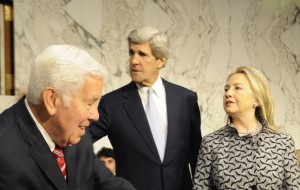WASHINGTON – Secretary of State Hillary Clinton, Secretary of Defense Leon Panetta and Chairman of The Joint Chiefs of Staff Gen. Martin Dempsey made a rare joint appearance on Capitol Hill Wednesday to urge the Senate to approve the United Nations Convention on the Law of the Sea. And Senate Foreign Relations Committee Chairman John Kerry added his support, saying the treaty was vital to the Navy’s future and the country’s security.

Sen. Richard Lugar, R-Ind., Sen. John Kerry, D-Mass., and Secretary of State Hillary Clinton mingle before a Senate Foreign Relations Committee hearing on the United Nations Convention on the Law of the Sea on Wednesday. (Andy Matarrese/MNS)
The treaty defines guidelines for nations in their use of the world’s oceans in terms of coastal territorial boundaries, shipping, the environment and natural resources. More than 160 nations have ratified the treaty, which concluded in 1982 and has been in force since 1994, but the United States is not among them.
“By not joining the treaty, we are abetting Russian ambitions in the Arctic. We are making the job of our Navy more difficult despite the long-standing and nearly unanimous pleas of Navy leaders,” said Sen. Richard Lugar, the top Republican on the committee. “The United States participation in Law of the Sea will help them maintain navigational rights more effectively, and with less risk to the men and women they command.”
“Even a mythical thousand-ship United States Navy could not patrol every strait, protect every economic interest or assert every navigational right” he said. “Attempting to do so would be prohibitively expensive and destructively confrontational.”
Panetta said the treaty would allow a better framework for resolving maritime disputes, one the U.S. now misses. It also would offer an alternative persuasive tool to the big stick. Rather than relying on “gunboat diplomacy,” it would provide a “rules-based” approach, he said.
“America is the strongest power in the world. We have the strongest Navy. Make no mistake, we have the ability to defend our interests anywhere, anytime,” Panetta said. “But we are strong precisely because we play by the rules.”
Kerry made it clear he would not bring the treaty to the Senate for a vote until after the election, citing his desire to keep the treaty separate from the “hurly-burly” of presidential politics.
“I do not want this treaty to become a victim to that race or the politics of the moment,” he said.
Witnesses and supporting senators explained accession to the treaty gives the U.S. more options and a better legal framework when it comes to opposing, for example, Chinese encroachment in the South China Sea or Iranian threats to blockade the Strait of Hormuz, a major artery for global oil shipping.
“The competition for resources is becoming far more pronounced and could potentially become far more dangerous,” Dempsey said.
As it stands, the U.S. relies on what’s called customary international law, or law derived from what is current accepted practice on the seas. The argument for joining the convention is that customs change, and because the signers of the convention – 160 other nations – are the ones who make the customs, being party to the treaty would allow the US to make sure they change favorably.
“I’m not comfortable with that any longer,” Dempsey said. “I think it is in our benefit to become part of that conversation.”
That the U.S. is not on board with the treaty has been “thrown right in our face” during negotiations with other countries, Panetta said. “And I’m sure they would love to continue to have that argument.”
Navy Secretary Ray Mabus, testifying before the Senate Armed Services Committee in March, also endorsed the treaty.
“Our notable absence as a signatory weakens our position with other nations,” he said, “allowing the introduction of expansive definitions of sovereignty on the high seas that undermine our ability to defend our mineral rights along our own continental shelf and in the Arctic.”
The treaty has been bouncing around the Senate since the Reagan administration, but Republican opposition has stalled Senate ratification. Critics say it could harm U.S. sovereignty in that it could mean American businesses and citizens would be subject to foreign regulations and taxes.
Kerry promised “exhaustive and fair hearings to examine all of the arguments” in the future. “We’re going have this thoroughly vetted … this will be coming out of everybody’s ears and people will be tired of it, and they’ll understand it.”
